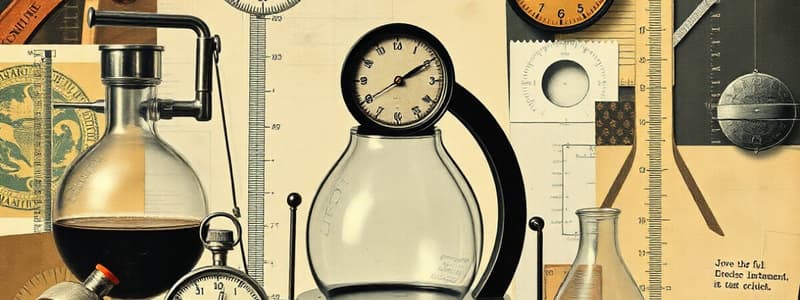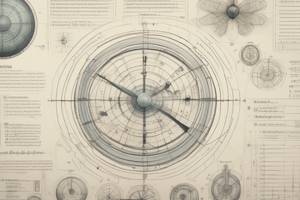Podcast
Questions and Answers
A researcher is conducting an experiment to test the effect of different fertilizers on plant growth. Which set of tools would be most appropriate for accurately measuring the mass of fertilizer and the volume of water added to each plant?
A researcher is conducting an experiment to test the effect of different fertilizers on plant growth. Which set of tools would be most appropriate for accurately measuring the mass of fertilizer and the volume of water added to each plant?
- Thermometer and stopwatch
- Flask and test tube
- Gram scale and graduated cylinder (correct)
- Petri dish and Bunsen burner
A scientist is observing a microscopic organism in a pond water sample. To get a better view of the organism's internal structures, which tool would be most appropriate?
A scientist is observing a microscopic organism in a pond water sample. To get a better view of the organism's internal structures, which tool would be most appropriate?
- Beaker
- Compound microscope (correct)
- Gram scale
- Bunsen burner
A researcher needs to heat a solution to a precise temperature for an experiment. Which of the following tools is most suitable for this purpose?
A researcher needs to heat a solution to a precise temperature for an experiment. Which of the following tools is most suitable for this purpose?
- Bunsen burner (correct)
- Graduated cylinder
- Gram scale
- Petri dish
When measuring the volume of a liquid in a graduated cylinder, what part of the liquid should you align with the measurement mark to ensure accuracy?
When measuring the volume of a liquid in a graduated cylinder, what part of the liquid should you align with the measurement mark to ensure accuracy?
Which characteristic is most important for scientific data to be considered valid?
Which characteristic is most important for scientific data to be considered valid?
Flashcards
What is the practice of science?
What is the practice of science?
Gathering measurable and verifiable information about the natural world.
What are gram scales?
What are gram scales?
Mass is measured using these.
What are beakers and graduated cylinders?
What are beakers and graduated cylinders?
Volume is measured using these.
What is the meniscus?
What is the meniscus?
Signup and view all the flashcards
What are compound microscopes?
What are compound microscopes?
Signup and view all the flashcards
Study Notes
- Science involves collecting data about the natural world.
- Data collected needs to be empirical, meaning it must be measurable and verifiable.
- Scientists use measurement, experimental, and observational tools.
Measurement Tools
- Common measurement tools include gram scales, beakers, and graduated cylinders.
- When using a graduated cylinder, check the marks and use the meniscus (bottom of the curve of the liquid).
- Measurements are always taken using the metric system or SI units.
Experimental Tools
- Common experimental tools include Bunsen burners, flasks, petri dishes, and test tubes.
Observational Tools
- A common observational tool is the compound microscope, which magnifies objects.
- Not all science occurs in a lab, so other tools are used depending on the field of study.
Studying That Suits You
Use AI to generate personalized quizzes and flashcards to suit your learning preferences.





